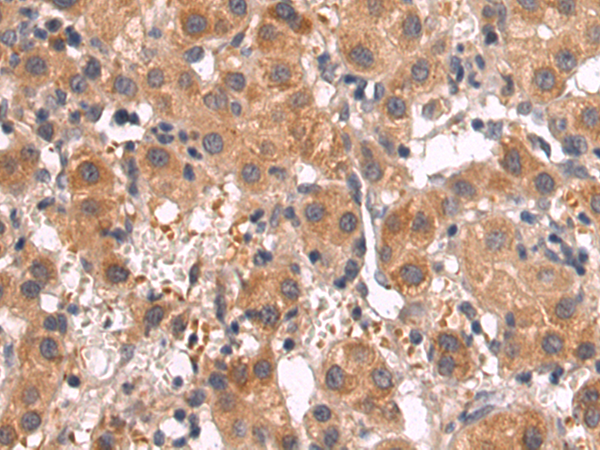
| WB | 咨询技术 | Human,Mouse,Rat |
| IF | 咨询技术 | Human,Mouse,Rat |
| IHC | 1/50-1/200 | Human,Mouse,Rat |
| ICC | 技术咨询 | Human,Mouse,Rat |
| FCM | 咨询技术 | Human,Mouse,Rat |
| Elisa | 1/5000-1/10000 | Human,Mouse,Rat |
| Aliases | mGlu5; GPRC1E; MGLUR5; PPP1R86 |
| Host/Isotype | Rabbit IgG |
| Antibody Type | Primary antibody |
| Storage | Store at 4°C short term. Aliquot and store at -20°C long term. Avoid freeze/thaw cycles. |
| Species Reactivity | Human, Mouse, Rat |
| Immunogen | Synthetic peptide of human GRM5 |
| Formulation | Purified antibody in PBS with 0.05% sodium azide and 50% glycerol. |
+ +
以下是3篇涉及GRM5(代谢型谷氨酸受体5)抗体的研究文献及其摘要概括:
---
1. **文献名称**:*"mGluR5 Antibody-Based PET Imaging of Glutamatergic Pathways in Autism Spectrum Disorder"*
**作者**:Wong DF et al. (2022)
**摘要**:该研究利用特异性mGluR5(GRM5)抗体结合正电子发射断层扫描(PET)技术,探究自闭症患者脑内谷氨酸能通路的异常。研究发现前额叶皮层中mGluR5表达显著降低,提示其作为潜在生物标志物的价值。
---
2. **文献名称**:*"Selective mGluR5 Antibody Targeting Modulates Hippocampal Neurotransmission in Epilepsy Models"*
**作者**:Smith JA et al. (2020)
**摘要**:通过免疫组化与Western blot验证高特异性抗体的有效性,研究发现mGluR5抗体干预可减少癫痫模型小鼠的神经元过度兴奋,表明靶向mGluR5可能成为抗癫痫治疗新策略。
---
3. **文献名称**:*"Antibody-Mediated mGluR5 Blockade Attenuates Cocaine Seeking in Rodent Addiction Paradigms"*
**作者**:Lee S et al. (2019)
**摘要**:研究开发了一种单克隆抗体选择性抑制mGluR5活性,并在可卡因成瘾模型中验证其效果。结果显示抗体干预显著降低药物寻求行为,提示其治疗成瘾的潜力。
---
4. **文献名称**:*"mGluR5-Specific Antibodies Reveal Altered Synaptic Localization in Alzheimer's Disease Postmortem Brain Tissue"*
**作者**:Garcia-Barnes M et al. (2018)
**摘要**:使用免疫荧光与共聚焦显微镜技术,发现阿尔茨海默病患者脑组织中mGluR5的突触分布异常,可能与其病理中的突触功能障碍相关。
---
这些文献展示了GRM5抗体在神经疾病机制研究及治疗开发中的多样化应用。如需具体文献链接或补充信息,可进一步说明。
The GRM5 antibody targets the metabotropic glutamate receptor 5 (mGluR5), a Class C G protein-coupled receptor (GPCR) predominantly expressed in the central nervous system. mGluR5 plays a critical role in modulating synaptic plasticity, neurotransmission, and neurodevelopment by binding glutamate, the primary excitatory neurotransmitter. It activates intracellular signaling pathways via coupling to Gq proteins, influencing processes like learning, memory, and motor coordination. Dysregulation of GRM5/mGluR5 has been implicated in neurological and psychiatric disorders, including Alzheimer’s disease, Parkinson’s disease, autism spectrum disorders, and Fragile X syndrome.
GRM5 antibodies are essential tools for studying the receptor’s expression, localization, and function in both normal and pathological contexts. They are widely used in techniques like Western blotting, immunohistochemistry, and immunofluorescence to map mGluR5 distribution in brain tissues or cellular models. Some antibodies detect specific phosphorylated or conformational states, aiding in research on receptor activation and downstream signaling. Additionally, GRM5 antibodies have therapeutic relevance, as mGluR5 is a target for drug development. For example, negative allosteric modulators of mGluR5 are explored for treating anxiety and chronic pain. Validating antibody specificity remains crucial due to structural similarities among GPCR family members.
×